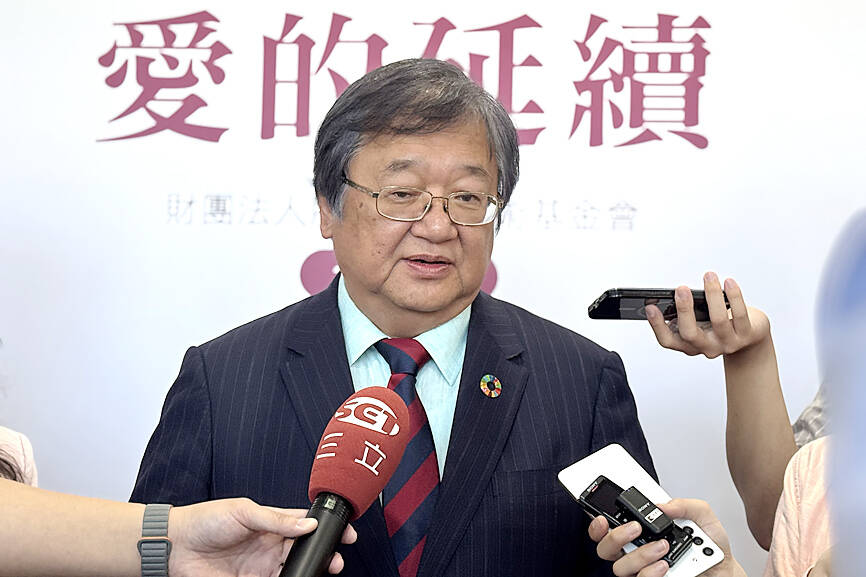Taiwan has already achieved the WHO’s hepatitis C elimination targets for 2030 and is working toward eliminating hepatitis B, Minister of Health and Welfare Chiu Tai-yuan (邱泰源) said yesterday.
The minister made the remarks while speaking to reporters on the sidelines of the Liver Disease Prevention and Treatment Research Foundation’s 31st anniversary event in Taipei.
Taiwan historically had widespread cases of hepatitis — especially hepatitis B — and before a nationwide vaccination program was launched in 1984, the prevalence was estimated to be 15 to 20 percent of the general population, and more than 90 percent of the adult population had been infected.

Photo: Chiu Chih-jou, Taipei Times
The prevalence of the hepatitis C virus was also estimated to be about 4 percent a decade ago, higher than the world average.
The Ministry of Health and Welfare in 1984 implemented the world’s first universal hepatitis B vaccination program for newborns, and since 2011, it has been offering a one-time free hepatitis B and C infection screening for adults aged 45 to 79, expanding the eligibility to people who are 39 to 79 starting this month.
Taiwan has already achieved the WHO’s hepatitis C elimination targets for 2030, and a ministry task force is writing up a report, which is to be completed before the end of October and to be submitted to the WHO’s Western Pacific Region, Chiu said.
The WHO’s targets for hepatitis C elimination by 2030 include 90 percent fewer new cases, 80 percent of people with chronic infection receiving treatment, and a 65 percent reduction in infection-related deaths compared with 2015 levels.
As the screening program has helped to detect many people with hepatitis B or C over the past few years, its eligibility was expanded so that more people could get screened and receive treatment as early as possible, Chiu said.
The ministry’s next goal is to eliminate hepatitis B, he added.
Meanwhile, reporters asked the minister about a social media post by a healthcare worker who said that the nurse-to-patient ratio of the day shift at the emergency department of the ministry’s Shuang Ho Hospital in New Taipei City could become as high as 1:13 — significantly higher than the standard of 1:6 for day shifts.
The health ministry would investigate the matter immediately, Chiu said.
The ministry has been making efforts to improve healthcare professionals’ working environment to retain doctors and nurses in healthcare facilities, especially in emergency and critical care departments, so non-compliance with the nurse-to-patient standard is not allowed, he added.
Additional reporting by CNA

The manufacture of the remaining 28 M1A2T Abrams tanks Taiwan purchased from the US has recently been completed, and they are expected to be delivered within the next one to two months, a source said yesterday. The Ministry of National Defense is arranging cargo ships to transport the tanks to Taiwan as soon as possible, said the source, who is familiar with the matter. The estimated arrival time ranges from late this month to early next month, the source said. The 28 Abrams tanks make up the third and final batch of a total of 108 tanks, valued at about NT$40.5 billion

Two Taiwanese prosecutors were questioned by Chinese security personnel at their hotel during a trip to China’s Henan Province this month, the Mainland Affairs Council (MAC) said yesterday. The officers had personal information on the prosecutors, including “when they were assigned to their posts, their work locations and job titles,” MAC Deputy Minister and spokesman Liang Wen-chieh (梁文傑) said. On top of asking about their agencies and positions, the officers also questioned the prosecutors about the Cross-Strait Joint Crime-Fighting and Judicial Mutual Assistance Agreement, a pact that serves as the framework for Taiwan-China cooperation on combating crime and providing judicial assistance, Liang

A group from the Taiwanese Designers in Australia association yesterday represented Taiwan at the Midsumma Pride March in Melbourne. The march, held in the St. Kilda suburb, is the city’s largest LGBTQIA+ parade and the flagship event of the annual Midsumma Festival. It attracted more than 45,000 spectators who supported the 400 groups and 10,000 marchers that participated this year, the association said. Taiwanese Designers said they organized a team to march for Taiwan this year, joining politicians, government agencies, professionals and community organizations in showing support for LGBTQIA+ people and diverse communities. As the first country in Asia to legalize same-sex

MOTIVES QUESTIONED The PLA considers Xi’s policies toward Taiwan to be driven by personal considerations rather than military assessment, the Epoch Times reports Chinese President Xi Jinping’s (習近平) latest purge of the Chinese People’s Liberation Army (PLA) leadership might have been prompted by the military’s opposition to plans of invading Taiwan, the Epoch Times said. The Chinese military opposes waging war against Taiwan by a large consensus, putting it at odds with Xi’s vision, the Falun Gong-affiliated daily said in a report on Thursday, citing anonymous sources with insight into the PLA’s inner workings. The opposition is not the opinion of a few generals, but a widely shared view among the PLA cadre, the Epoch Times cited them as saying. “Chinese forces know full well that